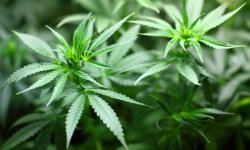Increased service raids on hemp stores across the country are underway. KAS and Customs and Fiscal Service officers are entering the stores, requisitioning all hemp products, intimidating employees by treating them as criminals. On what basis are these activities going on? Does the Polish hemp industry have a big or very big problem? Could it be protected from this situation? Here is more information.
Service raids on hemp stores across the country
The service raids on cannabis stores have been going on, in truth, for several weeks. Initially, these were only tax inspections, during which smoking hemp products without excise labels were requisitioned. We have written about the topic of excise taxes on hemp products in T U T A J. Unfortunately, to date, the vast majority of products that should, according to the law, be excised - do not have excise taxes.
Personally, I know more hemp entrepreneurs who think that since marjoram in the store doesn't have excise duty, hemp doesn't have to either, than those who want to operate in accordance with the current legislation. The vast majority of the industry has so far pretended like they don't know these regulations, which has actually created a huge hemp grey market. The vast majority of the industry pretends not to understand the concept of "product destination." The hemp industry, instead of coming to terms with the excise tax and striving to keep its thresholds as low as possible - preferred to pretend that the topic doesn't exist and there's no need to think about it at all.
And that's how the hemp gray market was created, which someone decided to look into.
Raids on hemp stores in connection with pharmaceutical law
The second reason for the raids on hemp stores is the pharmaceutical law. When the law legalizing the use of cannabis for medical purposes went into effect, THC, the drug's active ingredient, made its way onto the table of Group I-N drugs. Drugs in this group are strictly controlled and can only be dispensed by a pharmacist upon presentation of a proper prescription. The truth is that according to current regulations, any amount of THC in a product (even 0.1%) makes the product should be on an RPW prescription. When you buy a kilogram of legal dried CBD, which contains 0.2% THC, you come into possession of 20 grams of THC, a strictly controlled substance that only a pharmacist can dispense.
In October 2020, an administrative court ruling came down, saying that any amount of THC in a product in classifies it as a Group I-N drug.
You can find the ruling in question along with the reasoning in T U T A J.
Citing this verdict, the services are also requisitioning hemp products with excise taxes. Many hemp store owners have suspended or partially suspended their operations. Such a crisis so far our hemp yard has not seen since CBD entered our consciousness for good.
Interestingly, we have information that MP Jaroslaw Sachajko, responsible for the recent amendment of the hemp law, consulted various ministries and services while working on it whether such a situation could occur and heard assurances that it could not. To date, no one has heard of this, final judgment either. Ok, almost no one, we have information that several well-known hemp activists and advocates knew about it, who kept this knowledge to themselves. Why? That is known only to them.
For the moment, the situation looks dire for the industry, legally it is forbidden to sell products that contain any amount of THC. It's worth adding that the notorious 0.3% THC limit applies only to farmers and their crops and yields.
The only possible and relatively quick solution to the situation at the moment is a quick amendment to the law, which will lead to the classification of medical marijuana (THC) from a certain concentration, such as 0.3%. Only then will hemp products be able to be distributed again and fully legally.


















